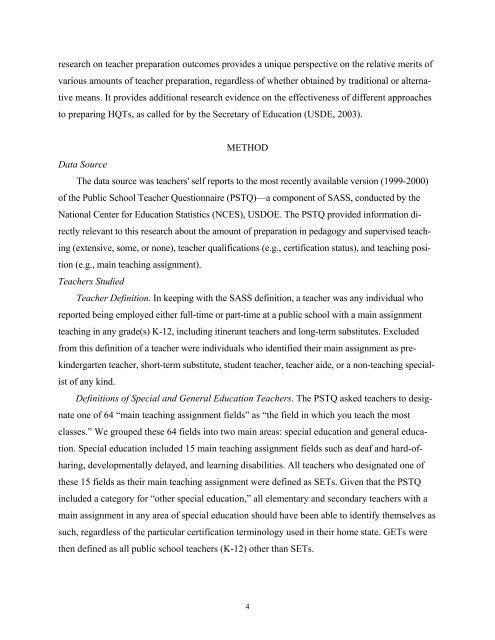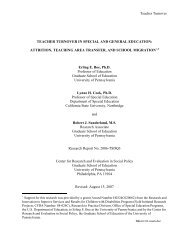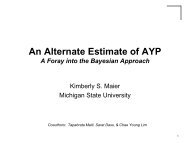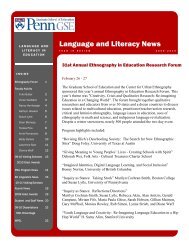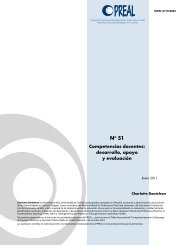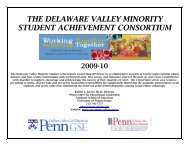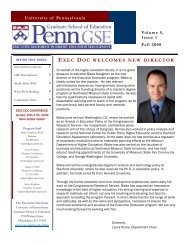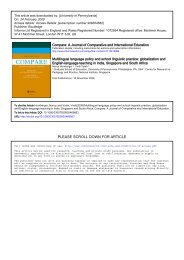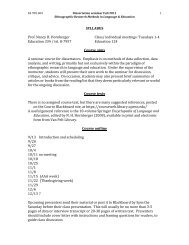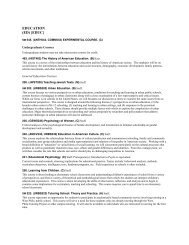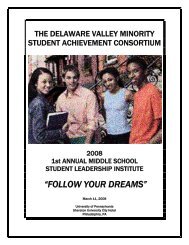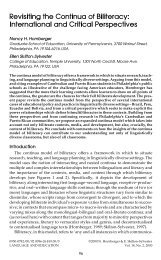does teacher preparation matter for beginning teachers in
does teacher preparation matter for beginning teachers in
does teacher preparation matter for beginning teachers in
Create successful ePaper yourself
Turn your PDF publications into a flip-book with our unique Google optimized e-Paper software.
esearch on <strong>teacher</strong> <strong>preparation</strong> outcomes provides a unique perspective on the relative merits of<br />
various amounts of <strong>teacher</strong> <strong>preparation</strong>, regardless of whether obta<strong>in</strong>ed by traditional or alternative<br />
means. It provides additional research evidence on the effectiveness of different approaches<br />
to prepar<strong>in</strong>g HQTs, as called <strong>for</strong> by the Secretary of Education (USDE, 2003).<br />
METHOD<br />
Data Source<br />
The data source was <strong>teacher</strong>s' self reports to the most recently available version (1999-2000)<br />
of the Public School Teacher Questionnaire (PSTQ)—a component of SASS, conducted by the<br />
National Center <strong>for</strong> Education Statistics (NCES), USDOE. The PSTQ provided <strong>in</strong><strong>for</strong>mation directly<br />
relevant to this research about the amount of <strong>preparation</strong> <strong>in</strong> pedagogy and supervised teach<strong>in</strong>g<br />
(extensive, some, or none), <strong>teacher</strong> qualifications (e.g., certification status), and teach<strong>in</strong>g position<br />
(e.g., ma<strong>in</strong> teach<strong>in</strong>g assignment).<br />
Teachers Studied<br />
Teacher Def<strong>in</strong>ition. In keep<strong>in</strong>g with the SASS def<strong>in</strong>ition, a <strong>teacher</strong> was any <strong>in</strong>dividual who<br />
reported be<strong>in</strong>g employed either full-time or part-time at a public school with a ma<strong>in</strong> assignment<br />
teach<strong>in</strong>g <strong>in</strong> any grade(s) K-12, <strong>in</strong>clud<strong>in</strong>g it<strong>in</strong>erant <strong>teacher</strong>s and long-term substitutes. Excluded<br />
from this def<strong>in</strong>ition of a <strong>teacher</strong> were <strong>in</strong>dividuals who identified their ma<strong>in</strong> assignment as prek<strong>in</strong>dergarten<br />
<strong>teacher</strong>, short-term substitute, student <strong>teacher</strong>, <strong>teacher</strong> aide, or a non-teach<strong>in</strong>g specialist<br />
of any k<strong>in</strong>d.<br />
Def<strong>in</strong>itions of Special and General Education Teachers. The PSTQ asked <strong>teacher</strong>s to designate<br />
one of 64 “ma<strong>in</strong> teach<strong>in</strong>g assignment fields” as “the field <strong>in</strong> which you teach the most<br />
classes.” We grouped these 64 fields <strong>in</strong>to two ma<strong>in</strong> areas: special education and general education.<br />
Special education <strong>in</strong>cluded 15 ma<strong>in</strong> teach<strong>in</strong>g assignment fields such as deaf and hard-ofhar<strong>in</strong>g,<br />
developmentally delayed, and learn<strong>in</strong>g disabilities. All <strong>teacher</strong>s who designated one of<br />
these 15 fields as their ma<strong>in</strong> teach<strong>in</strong>g assignment were def<strong>in</strong>ed as SETs. Given that the PSTQ<br />
<strong>in</strong>cluded a category <strong>for</strong> “other special education,” all elementary and secondary <strong>teacher</strong>s with a<br />
ma<strong>in</strong> assignment <strong>in</strong> any area of special education should have been able to identify themselves as<br />
such, regardless of the particular certification term<strong>in</strong>ology used <strong>in</strong> their home state. GETs were<br />
then def<strong>in</strong>ed as all public school <strong>teacher</strong>s (K-12) other than SETs.<br />
4


